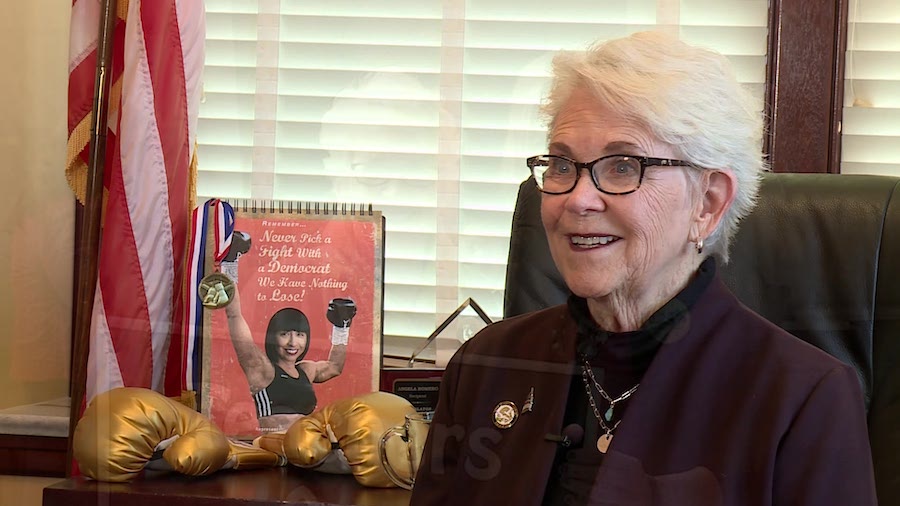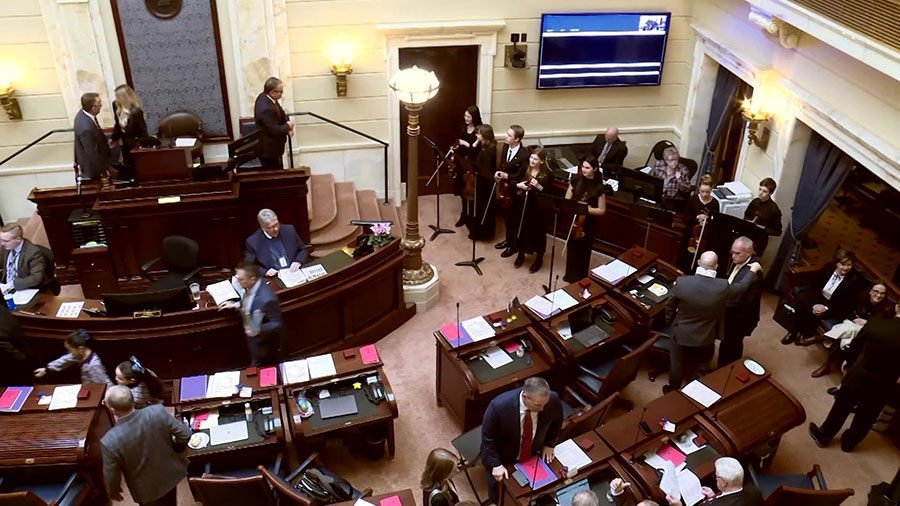Immigration Issues Impact All Of Us
Jul 1, 2021, 8:23 PM
“My top people over there that I couldn’t farm without, all immigrants.”
Multiple industries having difficulties finding labor. Today we’re diving into the issues the construction and farming industries are facing, and how they impact us here at home.
Let’s start at the grocery store. According to the USDA, we spend less on food than ever before. Between 1960 and 1998, the average share of disposable personal income spent on total food by Americans fell from 17% to 10%. In 2019, the USDA said Americans food budgets hit an historic low, just 9.5% of our income goes to food, that’s groceries and eating out.
One of the big reasons we spend less–immigrant farmworkers. They make up 70% of the agricultural workforce nationwide. And my colleague Garna Mejia sat down with us.
Interview edited lightly for clarity and readability.
Matt Rascon: I know that you’ve been looking at some of these issues surrounding immigration when it comes to these industries. So let’s start with agriculture. You met with Ron Gibson, he’s the president of the Utah Farm Bureau Federation,
Garna Mejia: Yeah, we took a drive up to Ron Gibson’s farm up north. And it was really interesting, something that he pointed out to us is his farm is heavily reliant on immigrant labor. So immigrants from different types of what we would consider legal status–those that live in the country that have the ability to work here and those that are actually coming in from other countries. The point of our visit was to specifically discuss the Farmers Workforce Modernization Act of 2021. And so what that bill does is it proposes changes to the agriculture industry, in terms of the type of workforce and laborers that they can bring on. At the end of the day, what Ron shared with us is that there’s a huge labor shortage on farms across Utah and across the country. So there’s some pros that he likes about this bill, but at the end of the day, it’s something that he’s going to oppose.
Matt Rascon: Why can’t he get workers right here in the US? And where’s the disconnect when it comes to actually bringing on these immigrant workers?
Garna Mejia: The issue that Ron brings up is quite frankly, there’s just not enough American born people, US born people with legal status, that want to work on a farm. He tells us that the salary is great, but they just don’t have the labor people interested in working in the field for you know, multiple hours a day. He shared with us there’s this program, which allows farmers to bring in workers from other countries, as I just mentioned, but there’s caps on it, there’s kind of a lot of regulations that go into play with it.
And he says it really comes down to something that affects everybody’s pocketbooks. If you want to continue paying $1.99 at the grocery store for a bag of grapes, then you need to kind of understand how this food supply works. And where there’s this break in people willing to go out into those fields and pick those products. So that’s kind of the issue is that there are just not American people that want these jobs. And he actually points out, which I thought was really interesting. He’s posted, you know, every year on KSL Classifieds, these job openings $15 an hour to go and work on the farm. He hasn’t had one person apply for that job that is not an immigrant.
Matt Rascon: But these aren’t jobs that you can necessarily go over to Home Depot and go grab someone.
Garna Mejia: What Ron said there are all levels of skilled labor that are required on a farm, from someone that’s picking grapes to the mechanic that’s fixing the tractor, to someone else that knows how to milk a cow. And so he says, there’s this concept that a lot of immigrant workers are not skilled, but a lot of these people are very, very skilled. They don’t have a bachelor’s or a Master’s or a law degree. But they have the ability to know how to care and nurture for an animal and help it produce more milk with it, which at the end of the day, ends up helping us.
He talks about how on his farm, there’s those key employees, that if he did not have them, his farm would not be able to function. And all of those key employees are from other countries came here as immigrants.
Matt Rascon: So let’s get back to the bill that you already mentioned–Farmers Workforce Modernization Act. It’s passed the House, it’s in the Senate. So just to recap it, it would give legal status to undocumented workers, increase the amount of visas for temporary foreign workers, mandate a wage increase up from $15 an hour here in Utah. What doesn’t Gibson like about the bill?
Garna Mejia: So he feels that the bill doesn’t address two key points, which he feels are like major obstacles that that farmers are facing. One of them is being able to have control over how many workers can come and work. Now, within the group of immigrant workers, you have another portion that are undocumented, right. So what he talks about is this, this act as it stands, it is going to put a cap on how many people can come and work and it doesn’t address the issue of what labor they can they can do. So he feels it’s an antiquated policy that we have in place from the 70s or 80s, you know, 60s when they were trying to help Americans feel like if you want these jobs, they can be yours. And we’re not going to, you know, shortchange you and drive down wages. And so there was caps like, if you were going to bring in a seasonal worker, then they had to be doing seasonal labor. So they could only be working on a tomato fields, because those are seasonal products, they could not come and work on a dairy farm. And that continues to be in place today.
And so Ron feels that that needs to be addressed. If you need a worker that’s in you know, a dairy, then they can come and work on the dairy, and do that maybe six, nine months that they shouldn’t be limited to the work that they can do. So that’s concept number one. The second concept is this bill requires that they have every year they’re going to get a wage increase. And so, you know, as he explains it, right now, they’re paying about $15 an hour, if their employees that are coming in to America, they also have to consider housing, and transportation. And he’s like, so at the end of the day ends up around $20.
He says if you take that in, you’re forcing an automatic wage increase, but you’re not forcing an automatic wage increase or cost increase of produce. And he’s like, it’s going to make us bankrupt. So if we have more workers that can come, but we can’t afford them. We’re still in the same problem.
The other thing that he brings up is that he doesn’t want it to be a federal control over how many workers can come and making those decisions. He feels that it’s something that needs to be done at the state level, and allowing each legislature to look at its agriculture industry, dairy farms, and figure out okay, how many workers do we need? Where are these gaps? And how can we best fill them in at the state level, you know, and give them that control?
Matt Rascon: So the bill would allow these farmworkers legal status in the country? What’s the the impact there? What was Gibson’s take?
Garna Mejia: So this, bill would also create a path towards a legal status for folks that have been working for years on a farm. I think it’s anywhere between four to eight years, it would give them a green card, so you wouldn’t become a citizen, but you would have residency. And so Ron really likes that. He says, You know, I have those employees. I’ve known those farm workers who are here as undocumented immigrants, and they don’t have that door open to them for upward mobility, right. So he says, those that have worked for us for years, they deserve that, let’s give them those opportunities.
However, that doesn’t necessarily solve the problem of having enough workers on a farm. Because the way he sees it is, if you give someone a legal status, you know, right now they’re doing this job because people turn a blind eye, maybe or it’s easier to get a job on a farm as an undocumented person. Once you have that legal status, you’re going to want to go to your local fast food restaurant and work in the air conditioning, or seek an education or do other things, you know, that are really part of the American dream.
That’s why that’s so important. And so he says, I love that concept. I think it’s great for for foreign workers. But the problem is, we still have a labor shortage on a farm. And so he really advocates for this concept of bringing in foreign workers to work temporarily to work here legally, but be able to go home at the end of a season or at the end of six months or whatever. And we spoke with a couple of the foreign workers that he had on the farm. And they mentioned to us, you know, I love where I come from, I love Mexico, El Salvador, I think there was some from Argentina. And if I can have that ability to continue coming and going, that’s what I would like to do. I want to remain in my country and have my family there, but be able to come and work here, make $15 in an hour, which for the exact same job, I would be making, you know, in Mexico, $15 in two days, perhaps.
Matt Rascon: Another industry that has really been struggling when it comes to immigrant workers is construction. And Garna, I know you spoke to Chad Magleby, the owner of Magleby Construction. What is the situation that he and his companies have found themselves in?
Garna Mejia: They’re heavily involved in the National Association of Homebuilders. They are putting a lot of money into lobbying efforts to bring a raise awareness about this worker shortage in the construction industry. And so they say, take a look at our construction sites across the valley, go to any new home projects go anywhere else that you need to go to, and you’re going to see that the majority of the folks that are working there are going to be foreign born, they’re going to be from different countries, or you know, they’re going to be immigrants. And so they say there is just this and I think I looked up a statistic, don’t quote me on it, but I can look it up for you guys. But I think a few years ago, maybe six to seven years ago, they were saying that for every four people that were retiring, there was only three people that were coming into to replace those jobs.
So you have this generation of skilled, hard work type of laborers that are leaving the industry that are going to be retiring, but you just don’t have enough of the new generation wanting and taking an interest in the construction industry. The majority of people that want to work are immigrants. But if they don’t have a legal status, folks like Magleby Construction cannot employ them.
Both parties that we spoke with, the farmers and Magleby Construction, feel that way. There’s just this real frustration with their perception of how Congress, how legislators, how political leaders on both sides of the aisle are handling this.
And so they say, you know, you can’t bag this into one thing, and it’s a heavily charged issue. There’s a lot of emotions with it. But at the end of the day, you have to understand the importance of immigrant work on our economy, right, and on building our cities and whatnot. So what Magleby was saying was, I’m just frustrated, and I’m done with politicians and their what he considers inaction when it comes to finding solutions for the construction industry. And this worker shortage that they say is currently present, and is only going to get worse in years to come.
And so what they did a couple of people was about five to six years ago, they decided, hey, maybe there’s a way we can go and find and recruit skilled laborers, people that want to work with their hands, carpenters, technicians, construction type workers, that we can recruit from another country, since we can’t find them here. So let’s try Mexico, we can find them, we can recruit them, we can train them, and maybe there’s a employment workforce visa program that they can come in, and legally work in America and be able to keep our company afloat and help us keep building America as it’s growing. And so they went down there, they set up shop, they tell me it cost them millions of dollars, only to find out that it’s a lot harder than they thought it was going to be. But that just kind of underscores their frustration with Congress and in political leaders and not addressing this broken system of immigration.
Matt Rascon: So they were tired of waiting around and really took things into their own hands.
Garna Mejia: That’s exactly what they did. So when they found all the hurdles with Mexico, they decided, Okay, well, why don’t we try like Puerto Rico, Puerto Rico does not have the same legal hurdles that you would have in Mexico, because Puerto Rico is a US territory. So they thought maybe we can find and recruit and train and certify folks from Puerto Rico, they can then come and work in the States. And so they told me that in the last four or five years, they’ve only had about 12 people that they’ve been able to help transition and move to the States. And out of those 12 people, only six have really stuck around, because there’s cultural differences, longer workweek in America versus Porto Rico. And so they say, you know, it’s that hard. And I said, you know, that’s really costly. And their answer to me was, yeah, but that’s six more workers than we had before.
And one of the other things he, I know he mentioned was that they do make it a point to only hire those who can come into the country legally. But that comes with its own costs. Not only financially but time it takes years. Right. It’s super expensive. And the system is so broken, that it encourages individuals to come here illegally.
As I understand it, from you know, farmers all over California, Utah, Arizona, there’s a system called E-Verify. So if you get a job on a farm, the federal government does not necessarily require you to verify that the information that that prospective employee has provided is legal. When it comes to the construction industry, they require every single employee to have a legal status and their paperwork has to be in order. And so they’re just more more set and what the requirements are and so Magleby because of that they are forced to only hire workers that have a legal status. And so that makes it that much harder. Because you know, if you have someone that wants to work, but they’re undocumented, they’re not going to be able to get a job on a construction site. But those are the people that want the job, right. And so that’s why they had to go out of the country and try to find workers that could legally and lawfully come into the country with some sort of an employment visa, and do it,
Matt Rascon: I think both of these stories that you covered, really drive home, the fact that what’s happening at the border, what’s not happening at the border, impacts us here at home.
Garna Mejia: Well, and I think you touch on a really important point, right? Because you can kind of look at this immigration thing, and we all want to just kind of make it simple, but it’s really a complex issue. Right. So what’s happening at the border doesn’t necessarily reflect the need and and the importance and the contributions that the immigrants have, currently, right now in the country that there is for that immigrant labor, you know, but those are issues that need to be addressed. And something that Magleby and that the farmers were saying is we’re not saying that, you know, we shouldn’t be able to track everyone that comes in the country like no, we should be able to legally and lawfully track people that come into the country and allow them and create opportunities for them, but also have consequences for those that you know, shouldn’t be here that are breaking the law, or quite frankly, just not contributing to building the American dream. And so something that they that’s that was part of their frustration with this, we’re just frustrated with politicians because they just make it all sound all or nothing. And we really just need to have a common sense approach to this immigration issue.
So the debate over immigration at our nation’s capitol continues. Of course, the frustrating part for some of these companies–the lack of urgency. And there’s no real timeline for when things might change for them and their workers.












